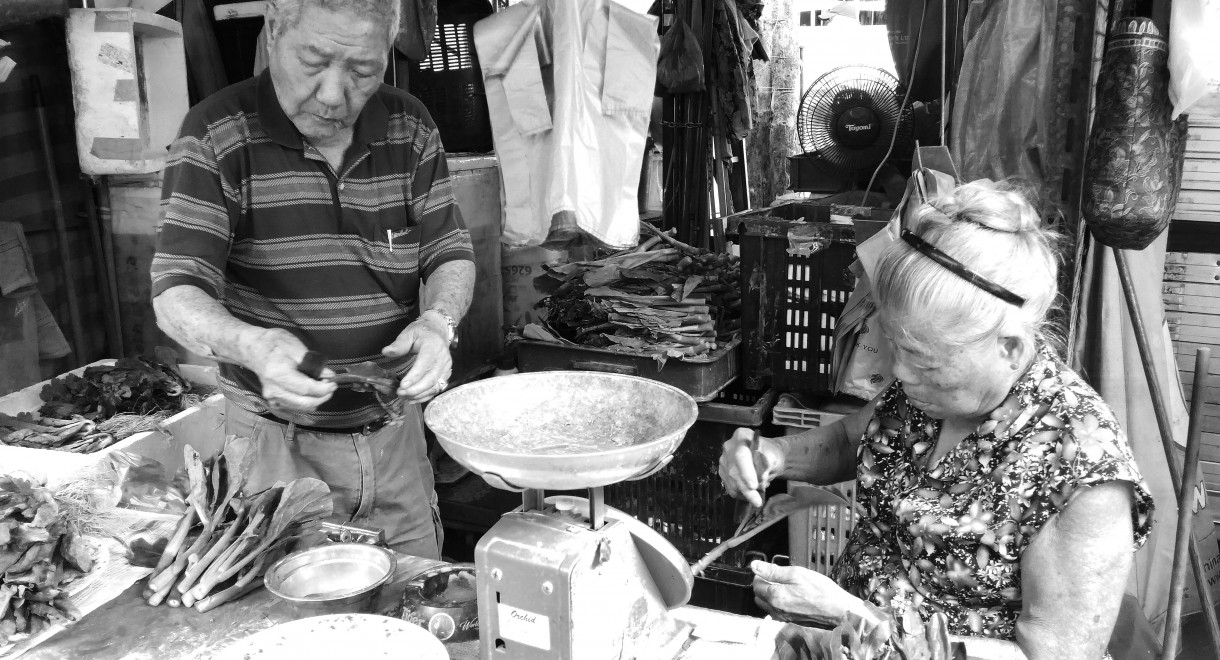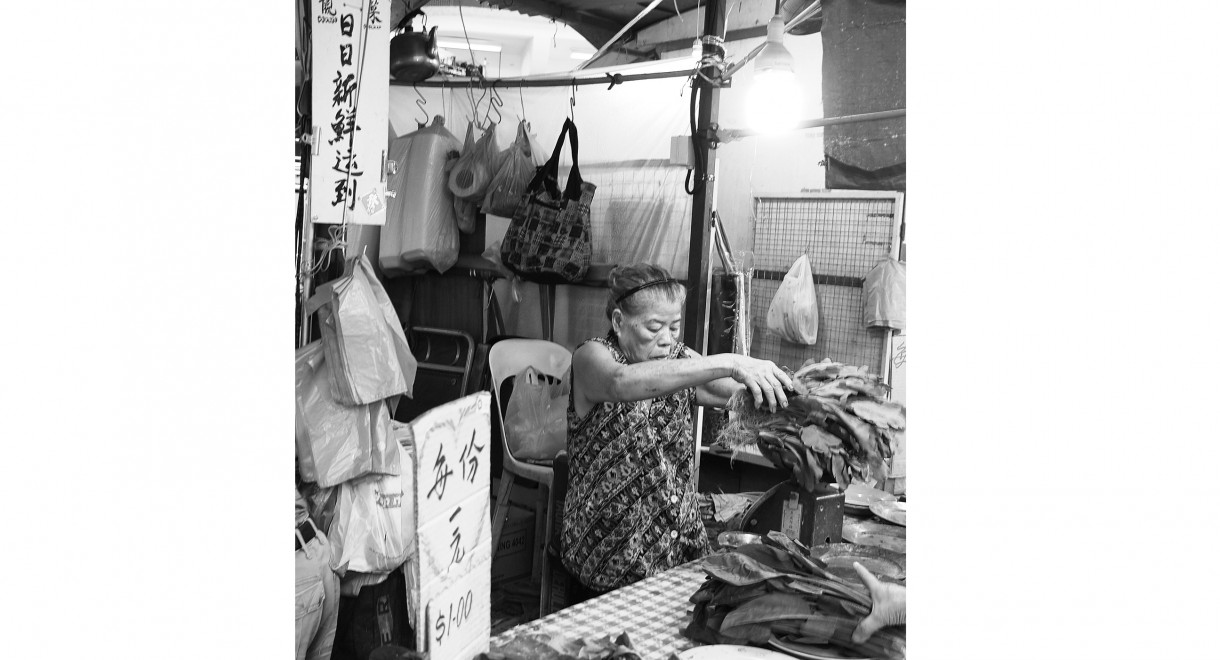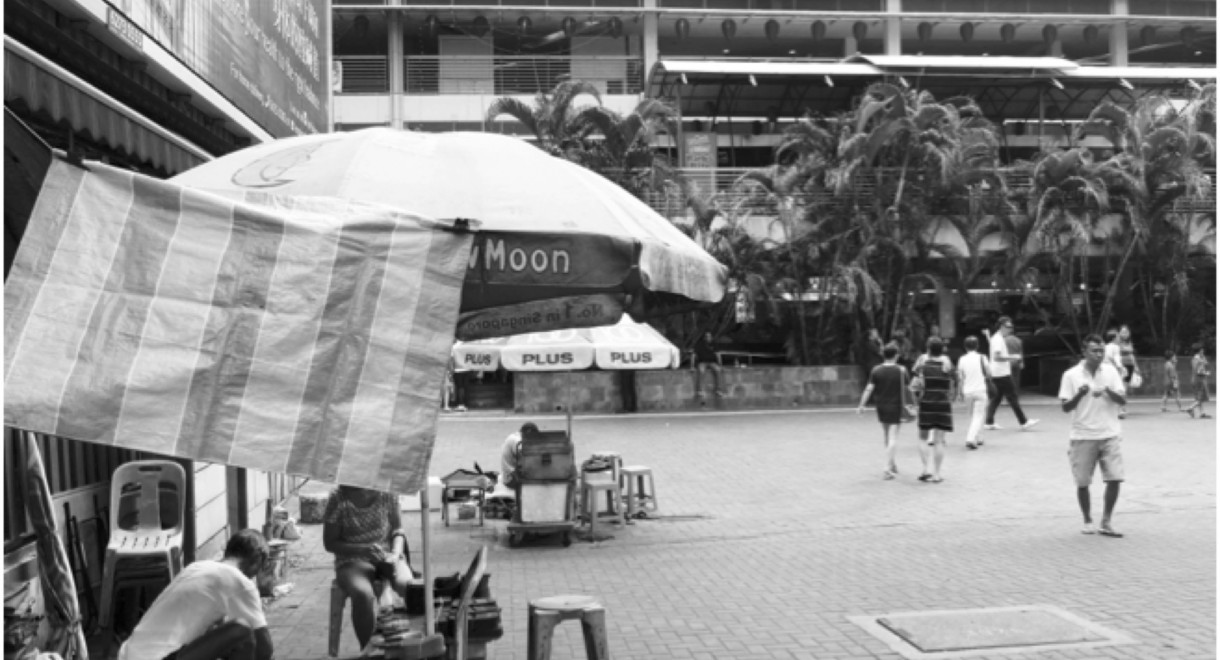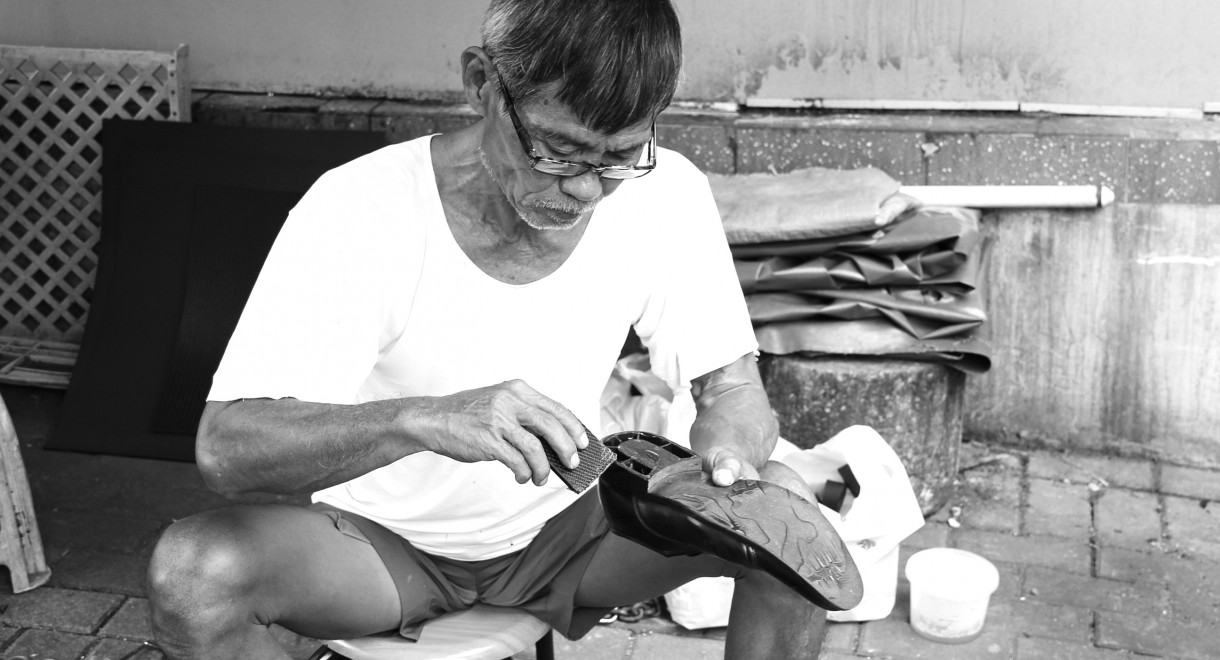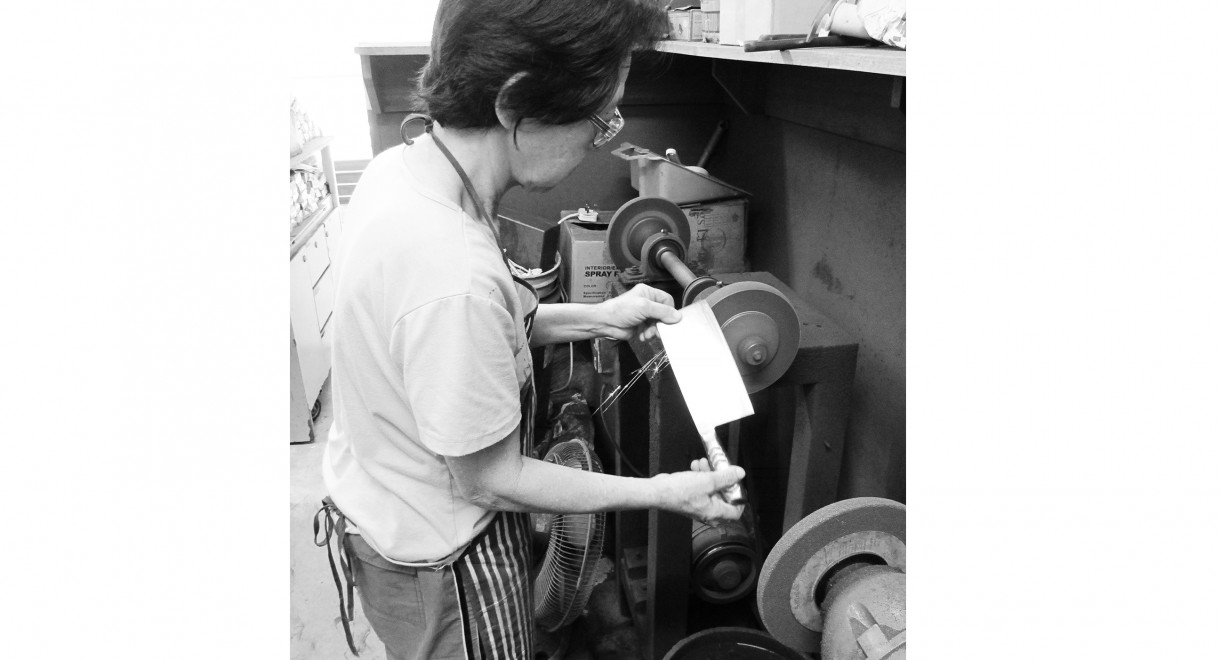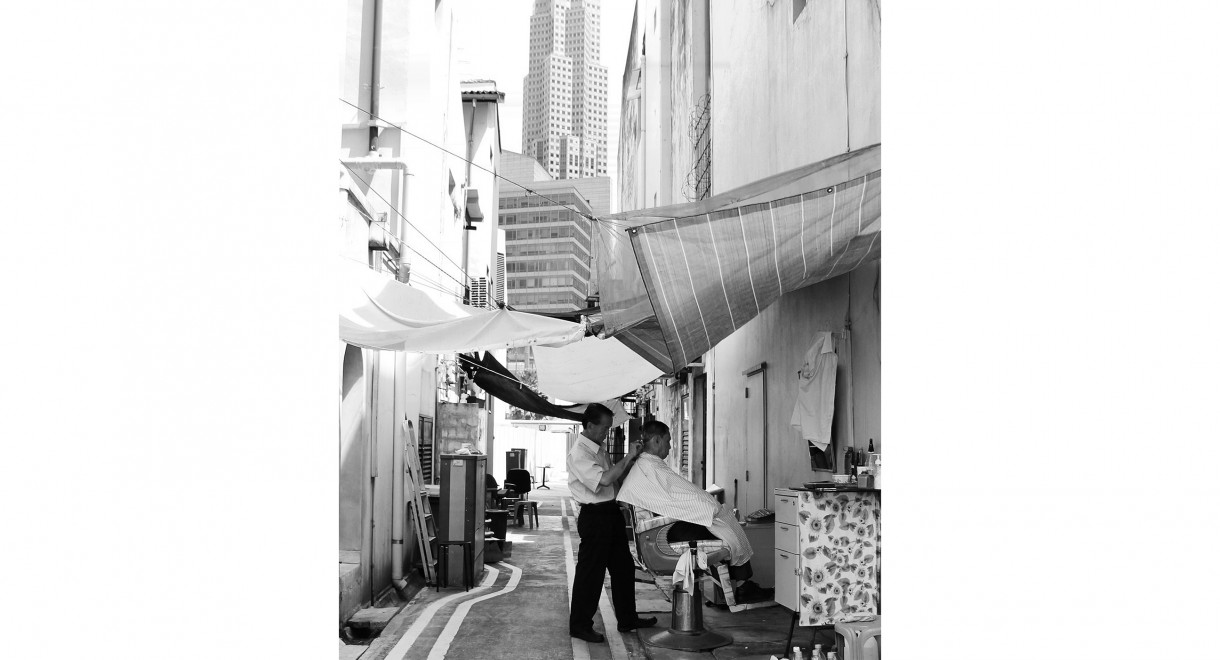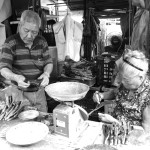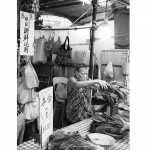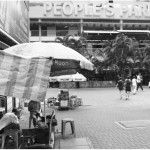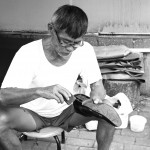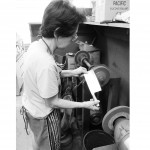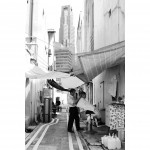Jennifer Teo (张楷玲)
I am a freelance photojournalist in my 20’s. I am interested preserving memories and personal histories through documentary photography. My goal for “Picturing Chinatown” was to share intimate personal life narratives that allow a deeper understanding of human behaviour. 我是一名自由摄影记者,通过纪实摄影来保存个人历史与生活记忆。我大多数的个人作业,都通过摄影和文字来反映风土民情,探索人与人之间的认同、依恋和归属感。我的作业选项反映了我对地方与人情的概念的浓厚兴趣。我为《光影纪实: 牛车水旧事新说 》定下了一个目标,就是为牛车水人民的生活留影。在讲述别人的故事的当儿,我有幸分享贴心的个人生活,对人类的特性有深一层的领悟。
May 11, 2015
Preserving Memories of Chinatown’s Dying Trades 为牛车水消失的行业保留记忆
Vegetable Sellers at Sago Lane 沙莪巷的菜摊
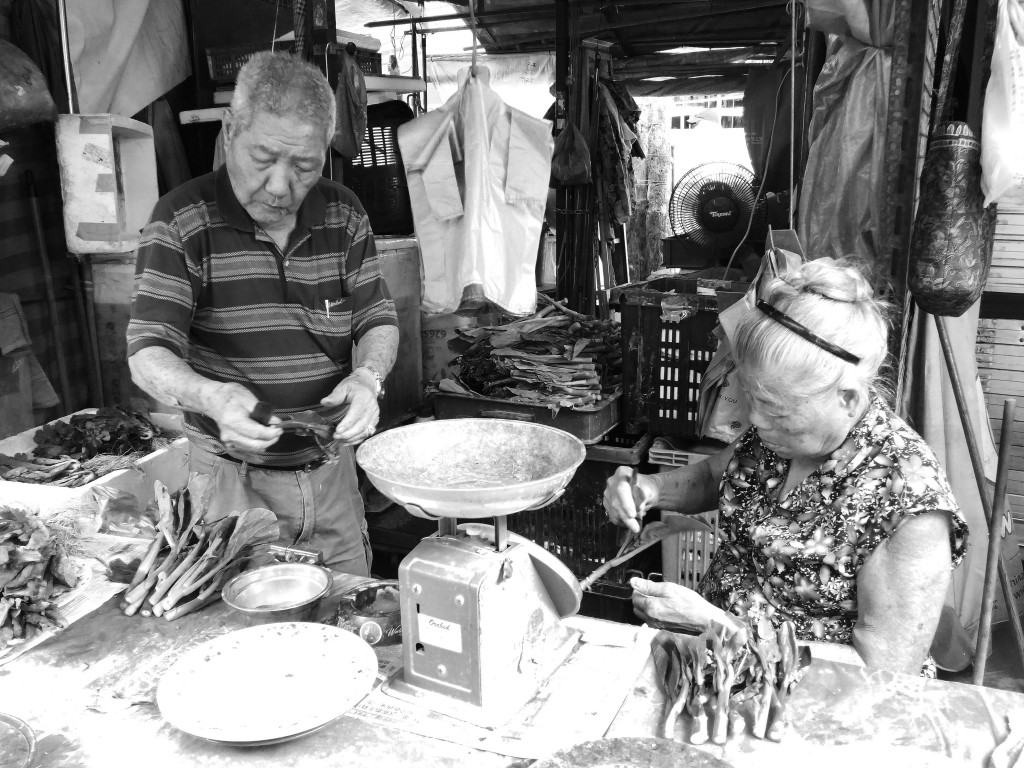
Picture (1): Mr. and Mr.s Kang have been running their Sago Lane vegetable stall for more than 60 years
图1:康先生夫妇在沙莪巷摆菜摊已经超过60年
Hawking was a traditional way of making ends meet. There is a sense of familiarity and belonging in Sago Lane, for Mr. and Mrs. Kang. Selling vegetables has been their way of life for 60 years. I can see that this way of life is passing. Yet, without their vegetable stall, Sago Lane would somehow seem unnaturally bereft of a comforting sight.
小贩是一门传统生计。对康先生夫妇而言,沙莪巷是一个既熟悉,又有归属感的地方。过去60年来,卖菜已经成为他们的日常生活。从康先生夫妇的菜摊,我看到生命的流逝。如果没有他们,沙莪巷只是普通的街道,显得不自然甚至空洞。
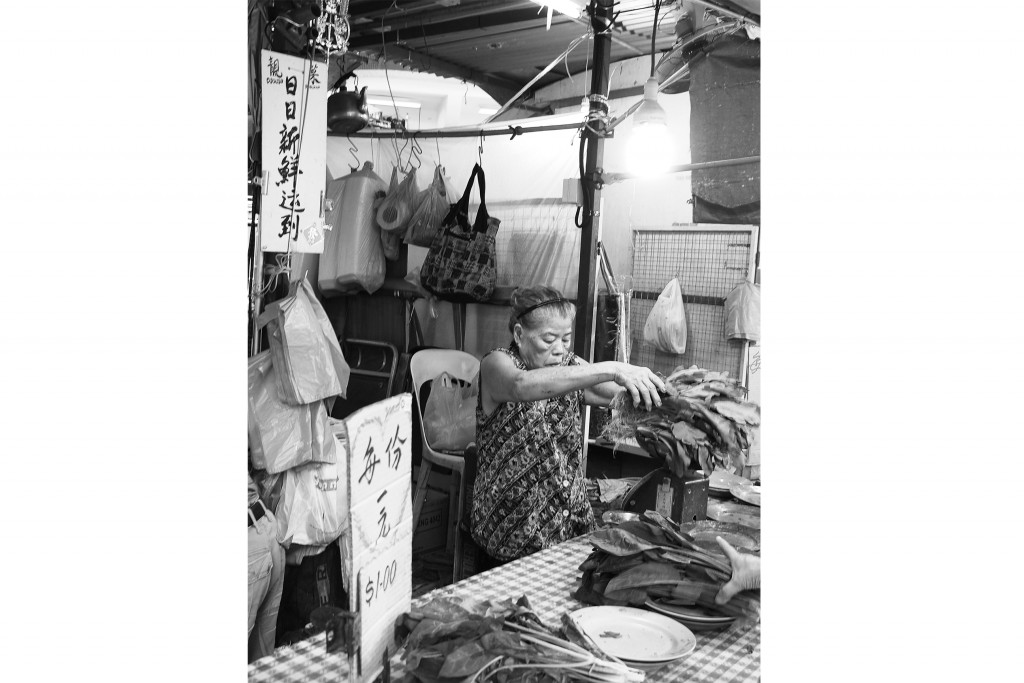
Picture (2):At a dollar a bundle, their vegetables are a bargain
图2:一元一扎,他们的蔬菜真便宜
There are still many elderly people like Mr. and Mrs. Kang struggling to earn a living on the streets because they really do not have many assets to support them. Much of the problem stems from the sad fact that the majority of them have long worked in the past before state-backed retirement benefits became mandatory. At a dollar a bundle, their vegetables are a bargain.
今天,还有许多老人家就像康先生夫妇一样,没有什么资产来维持生活,只好在街头度日。他们所面对的困境,主要来自过去的政策,没有强制的退休利益来保障晚年。
Street Cobbler At People’s Park Complex (Cobbler Square) 珍珠坊的补鞋匠
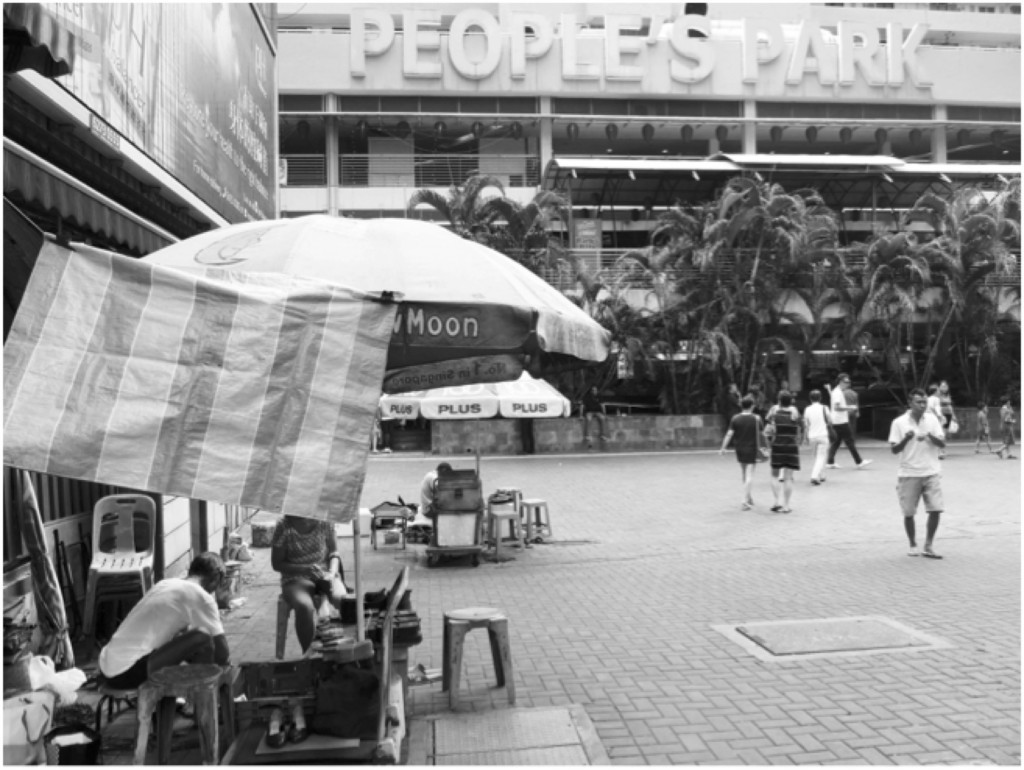
Picture (3): Located at Exit C of Chinatown MRT Station, there is a lingering smell of grease and rubber in the air
图3:牛车水地铁站C出口,挥之不散的橡胶和胶水味
Located at Exit C of Chinatown MRT Station, there is a lingering smell of grease and rubber in the air. Passing by Cobbler’s Square is akin to a walk down memory lane. The cart has remained, and so has the cobbler’s toolkit. Most importantly, these cobblers continue to ply their honest trade with heart and soul.
走过珍珠坊前的“鞋匠广场”就如步入时光隧道,补鞋匠的推车依旧,工具包依旧。最重要的,这些补鞋匠全心全意,为顾客服务的诚挚精神亦依旧。
A long-time cobbler in Chinatown is Mr. Kwek who is in his 60s. Why did Mr. Kwek choose this trade? He says the main draw is the freedom it accords him. He used to work 16-hour shifts as a hawker. After 40 years of slicing, steaming and serving fish noodles, it became too much for him. His day as a cobbler typically begins at 10am and ends around 7pm. Will you keep doing this until you retire? I asked. He gave a bark of laughter. He said if he doesn’t work, there’d be no money for him to live on.
60多岁的郭先生在牛车水当了多年的补鞋匠,他选择这份行业是因为时间自由。转行前郭先生当过40年的熟食小贩,每天工作16小时,重复着切鱼片,煮食和端送鱼片米粉的作业。随着年龄渐大,这份长时间的差事不再适合他。身为一名补鞋匠,郭先生每天上午十点开裆,傍晚七点收拾回家。“你会继续补鞋,直至退休吗?”我问。郭先生爆笑,没有这份入息,根本无法过活。
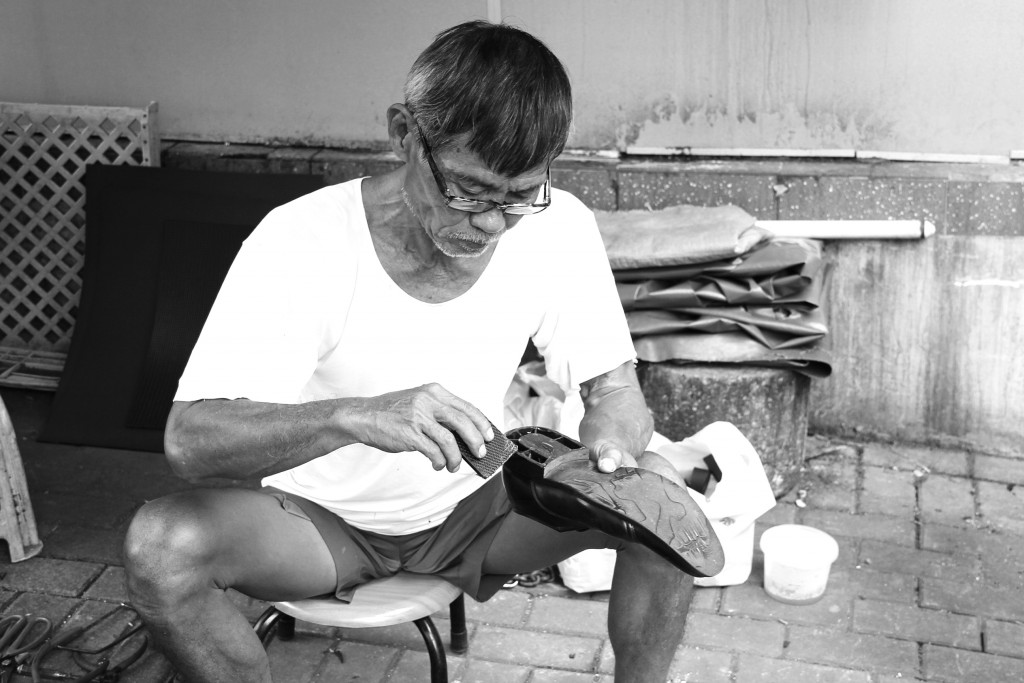
Picture (4): A long-time cobbler in Chinatown, Mr. Kwek, who is in his 60s
图4:60多岁的郭先生,长期在牛车水打拼的补鞋匠
Selecting rubber soles from the table before him, Mr. Kwek started to work on some shoes. It was not an easy living, he told me as he opened up a can of glue. As a hawker selling fish noodles since age 16 he would earn up to $120 a month. Back then, that was a lot of money.
郭先生选择合适的橡胶鞋底,开始补鞋。他边打开胶水罐边告诉我,补鞋并不是份容易赚钱的差事。他16岁入行卖鱼片米粉,每个月可以赚取120元。在那个年代,这是一笔相当客观的收入。如今,他每天有约100元的入息,但还是不足够。不过,郭先生认为人不应该过度迷恋金钱,他经常介绍顾客给其他的补鞋匠,让他们多赚几个钱。
Now, he earns about $100 daily, on average—it’s just enough to get by. However Mr. Kwek believes one should not be overly obsessed with money and often introduces customers to other cobblers to help them earn more money. Such a simple life Mr. Kwek leads. Yet how many of us in this busy metropolis can lead such a life? I pondered.
郭先生所过的是简单从容的日子。在这个繁忙的都市中,有多少人能够简单地生活?我不禁陷入沉思中。
Knife And Scissor Sharpener at People’s Park Complex 珍珠坊的磨刀师傅
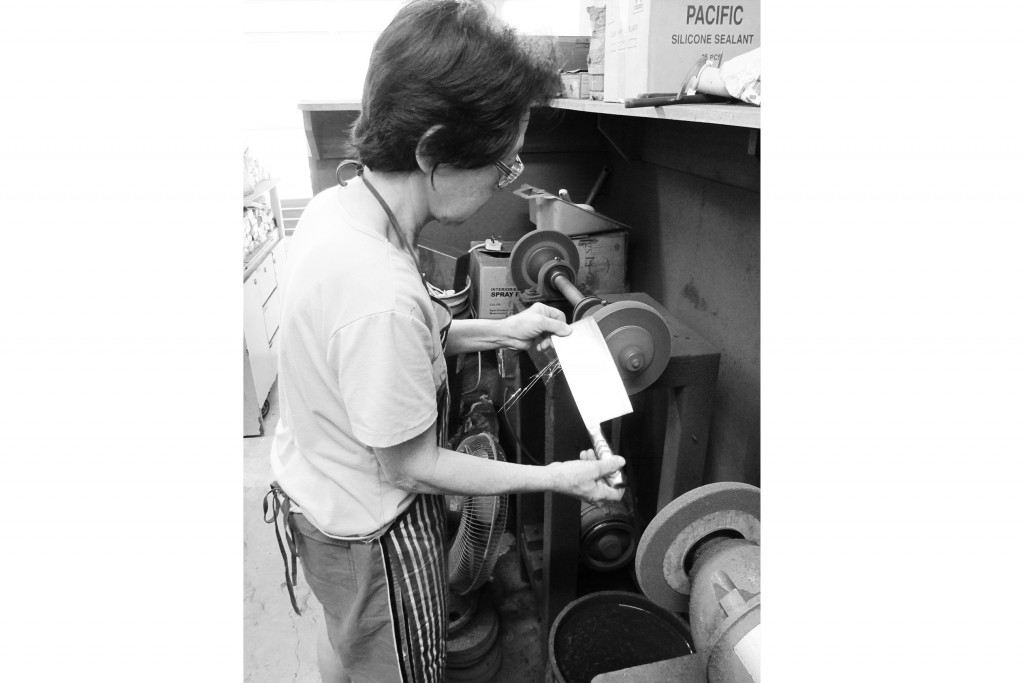
Picture (5): Mdm. Lee in her 60s, has been operating her knife and scissor sharpening trade in Chinatown for more than 40 years
图5:60多岁的李女士,在牛车水度过40余年的磨刀岁月
Mdm. Lee in her 60s, has been operating her knife and scissor sharpening trade in Chinatown for more than 40 years. Standing at a distance, I could hear a shrill, but tuneful whistle reverberate around the corner of second level at People’s Park Complex. I then saw Mdm. Lee holding each knife in two hands carefully passing it back and forth, a craftsman of a dying trade.
珍珠坊二楼角落传来尖锐却有规律的声音。循着回荡的空气走去,我看到李女士双手各持着一把刀子,仔细地前后挪动着。这是一门消失中的手艺。
During the time of Mdm. Lee’s father, knife grinding was a prevalent trade—since it was expensive to buy a new pair of scissors or a knife. It was also a belief that scissors become more seasoned and worked better when sharpened. People therefore preferred to have their knives and scissors sharpened rather than buy new ones. Mdm Lee officially took over the business from her father in 1970.
李女士的父亲的年代,钢刀的价格颇昂贵。当时大家都相信新刀那有旧刀好,剪刀会越磨越顺手,磨刀成为一门普遍的行业。1970年,李女士正式接管父亲的生意。
I really think Mdm. Lee’s job is hard work. With so many scissors to be sharpened and everyone wanting it to be done quickly, Mdm. Lee has to work from morning till night, on her feet. She cannot complete the job sitting down because, to slide the blade, she needs to use force.
我觉得李女士的工作很不容易,那么多顾客、那么多把剪刀在等着,李女士必须跟时间赛跑。磨刀的功夫少不了手力,不能坐着,必须从早站到晚,手艺与体力都很考究。
Back-Alley Barber At Amoy Street 厦门街后巷的理发师傅
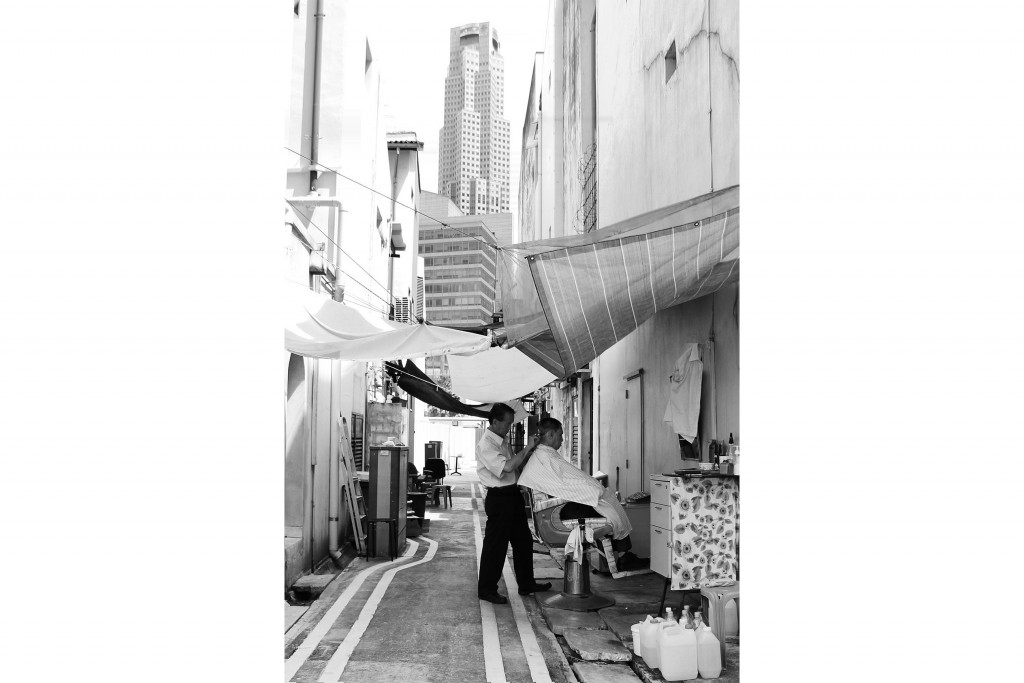
Picture (6): Mr. Lee, a 75-year barber, has groomed his loyal customers for more than 50 years
图6:75岁的李先生,为忠诚的客户理了50年头发
Mr. Lee, a 75-year barber, has groomed his loyal customers for more than 50 years.Back alley barbers are rare sight indeed. On this street, a lone, rusty barber’s chair sits, sheltered from rain and shine by a canvas sheet. A small cupboard holds old-fashioned tools-a manual clipper and strip of leather.
后巷的理发师已经被逐渐淘汰。厦门街的巷子有一张生锈的理发椅,小橱柜摆放着老式工具 – 传统的手推剪和皮革条。帆布帐篷为小档口遮阳挡雨。
Mr. Lee has been a barber for 50 years! Trading in nostalgia, he has sold two of his three barber chairs. The last chair has remained embedded in precisely the same spot in those five decades. Mr. Lee still enjoys brisk business, mainly due to the loyal following of elderly men and migrant workers seeking cheap, hassle-free trims.
李先生已经当了50余年的理发师。李先生曾经拥有三张旧式的理发椅,不过已经将两张变卖了,剩下这一张数十年如一日,摆放在同一个位置。多年来,李先生的生意源源不绝,客户来自忠诚的老主顾和要求简单实惠的外劳。
When he first learnt his trade in his teens, Mr. Lee was taught to be kind and develop a relationship with customers: to listen to their needs and count on his skills for the rest. He was told that if he followed these simple principles, he would have all the customers he needed to support him. Mr. Lee knows he does not have to be an excellent barber to continue to have good business. If the customers feel a rapport with you, you could be operating in an alley without a proper shop front, but people would still come.
李先生初入行时,老师傅教导他必须对顾客友善,缔结情谊:聆听他们的需求,以手艺来完成作业。只要遵守这些简单的守则,就能够拥有顾客群。李先生知道他不需要成为最出色的理发师,只要跟顾客相处融洽,即使是在后巷营业,顾客依旧会找上你。
I find the juxtaposition of Mr. Lee’s shabby street shelter in the foreground with the financial buildings in the background a big reminder of how far the country has progressed.
李先生破落的街边帐篷和背后的金融大厦形成强烈的对比,它提醒我们新加坡腾飞的步伐。
When Singapore underwent massive industrialization, old buildings were torn down to give way to high-rise, modern buildings. With better technology and a higher standard of living, roadside barbers were replaced by more modern and sophisticated salons. Soon stalls like Mr. Lee will become only a memory.
在急速工业化的进程中,老建筑被拆除,高楼大厦耸立。在高科技与不断提升的生活素质下,路边理发档被现代化的美发院所取代。很快的,李先生这类理发档将会走入城市的记忆中。
Chinatown has changed a lot over the decades and I’m not sure I’m entirely comfortable with it…it was mine and not mine. Wherever I go around Chinatown, I see glimpses of events from years ago – playing out in front of me in an endless loop. It’s only when you go to a place you thought you know very well and see how it’s changed that you have a real sense of the passing of time.
数十年间,牛车水经历过沧海桑田,我不晓得是否能够适应这样的变化…..它是我的牛车水,又好像不属于我。每当我在牛车水蹓跶,昔日的人与事一幕幕地重现,无始无终。只有去到一个十分熟悉的地方,见证着它的变迁,才能真正体会到时光的流逝。
As I languish in the past, trying to pull apart my imagination from the bits and pieces of our actual reality, I am left thinking only of the present. Time has been manipulated so that the present will never again feel as authentic as the past. It no longer belongs to us; we are all in a constant state of playing catch up as time moves forward at lightening speed. In turn, we crave the authentic, superimposing the familiar filter of nostalgia to cope with our ever-changing environment. When the object is gone, one forgets and then you retrieve, but only through the bittersweet lens of nostalgia.
我陷入苦恼的回忆中,尝试分辨想像与现实中的点点滴滴,到头来我发觉只能回到当下。时间已经被操纵,当下的牛车水已经不是地道的从前。时间不属于我们,我们只是在恒定的状态下追赶着分秒流逝的每一时每一刻。我们能做的,是在不断变化的环境下,将最原始、最真实的一面与怀念的思绪交叠。人过境迁之后,我们会忘记,日后会想起,在苦乐参半的镜头下,重拾旧时的记忆。
译/李国樑

